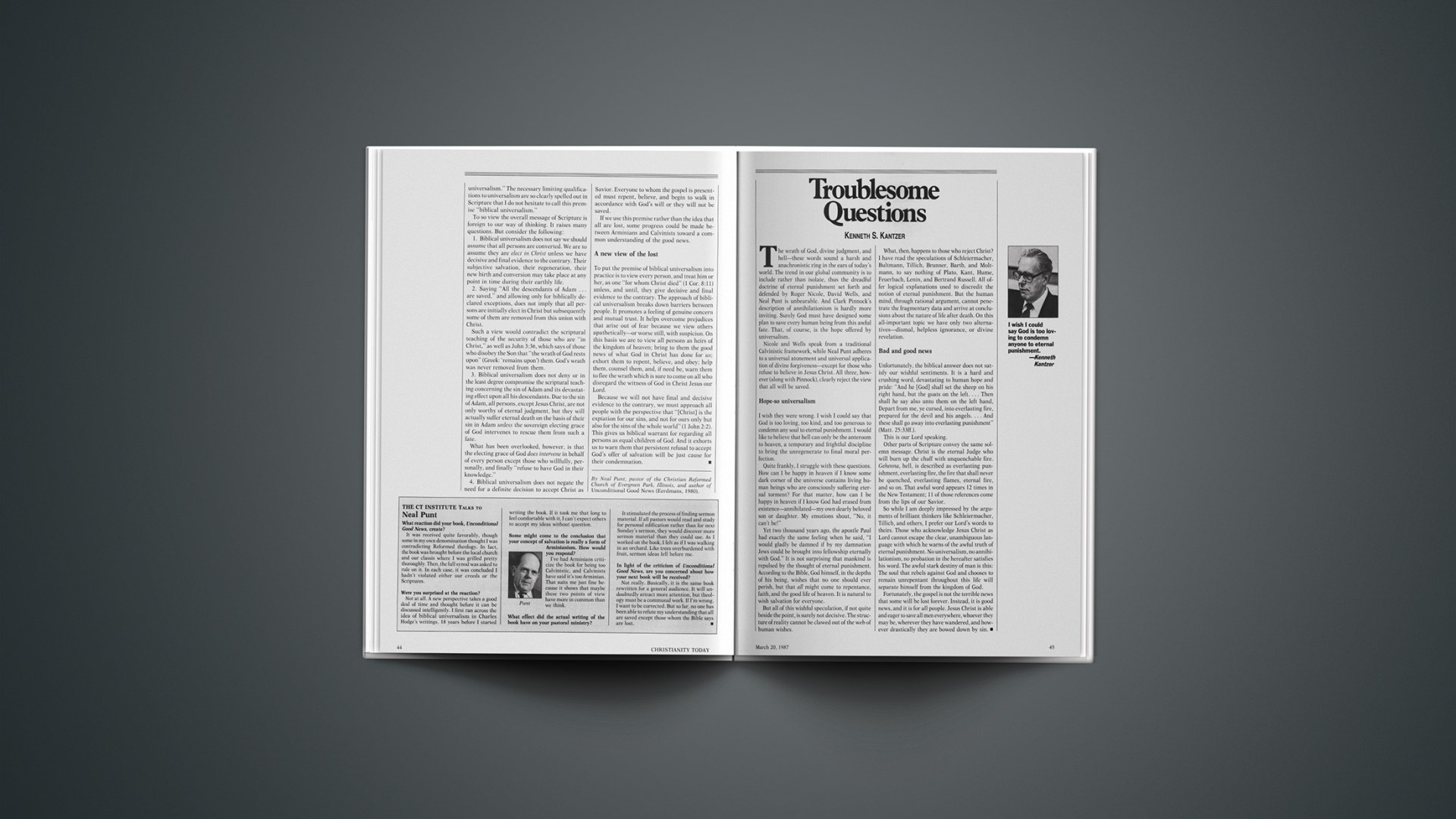The wrath of God, divine judgment, and hell—these words sound a harsh and anachronistic ring in the ears of today’s world. The trend in our global community is to include rather than isolate, thus the dreadful doctrine of eternal punishment set forth and defended by Roger Nicole, David Wells, and Neal Punt is unbearable. And Clark Pinnock’s description of annihilationism is hardly more inviting. Surely God must have designed some plan to save every human being from this awful fate. That, of course, is the hope offered by universalism.
Nicole and Wells speak from a traditional Calvinistic framework, while Neal Punt adheres to a universal atonement and universal application of divine forgiveness—except for those who refuse to believe in Jesus Christ. All three, however (along with Pinnock), clearly reject the view that all will be saved.
Hope-So Universalism
I wish they were wrong. I wish I could say that God is too loving, too kind, and too generous to condemn any soul to eternal punishment. I would like to believe that hell can only be the anteroom to heaven, a temporary and frightful discipline to bring the unregenerate to final moral perfection.
Quite frankly, I struggle with these questions. How can I be happy in heaven if I know some dark corner of the universe contains living human beings who are consciously suffering eternal torment? For that matter, how can I be happy in heaven if I know God had erased from existence—annihilated—my own dearly beloved son or daughter. My emotions shout, “No, it can’t be!”
Yet two thousand years ago, the apostle Paul had exactly the same feeling when he said, “I would gladly be damned if by my damnation Jews could be brought into fellowship eternally with God.” It is not surprising that mankind is repulsed by the thought of eternal punishment. According to the Bible, God himself, in the depths of his being, wishes that no one should ever perish, but that all might come to repentance, faith, and the good life of heaven. It is natural to wish salvation for everyone.
But all of this wishful speculation, if not quite beside the point, is surely not decisive. The structure of reality cannot be clawed out of the web of human wishes.
What, then, happens to those who reject Christ? I have read the speculations of Schleiermacher, Bultmann, Tillich, Brunner, Barth, and Moltmann, to say nothing of Plato, Kant, Hume, Feuerbach, Lenin, and Bertrand Russell. All offer logical explanations used to discredit the notion of eternal punishment. But the human mind, through rational argument, cannot penetrate the fragmentary data and arrive at conclusions about the nature of life after death. On this all-important topic we have only two alternatives—dismal, helpless ignorance, or divine revelation.
Bad and Good News
Unfortunately, the biblical answer does not satisfy our wishful sentiments. It is a hard and crushing word, devastating to human hope and pride: “And he [God] shall set the sheep on his right hand, but the goats on the left.… Then shall he say also unto them on the left hand, Depart from me, ye cursed, into everlasting fire, prepared for the devil and his angels.… And these shall go away into everlasting punishment” (Matt. 25:33ff.).
This is our Lord speaking.
Other parts of Scripture convey the same solemn message. Christ is the eternal Judge who will burn up the chaff with unquenchable fire. Gehenna, hell, is described as everlasting punishment, everlasting fire, the fire that shall never be quenched, everlasting flames, eternal fire, and so on. That awful word appears 12 times in the New Testament; 11 of those references come from the lips of our Savior.
So while I am deeply impressed by the arguments of brilliant thinkers like Schleiermacher, Tillich, and others, I prefer our Lord’s words to theirs. Those who acknowledge Jesus Christ as Lord cannot escape the clear, unambiguous language with which he warns of the awful truth of eternal punishment. No universalism, no annihilationism, no probation in the hereafter satisfies his word. The awful stark destiny of man is this: The soul that rebels against God and chooses to remain unrepentant throughout this life will separate himself from the kingdom of God.
Fortunately, the gospel is not the terrible news that some will be lost forever. Instead, it is good news, and it is for all people. Jesus Christ is able and eager to save all men everywhere, whoever they may be, wherever they have wandered, and however drastically they are bowed down by sin.










